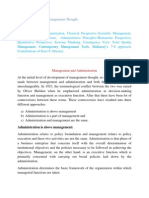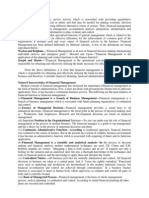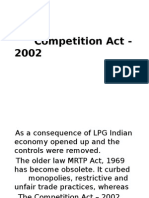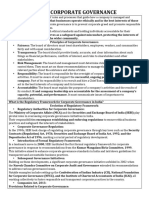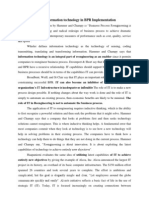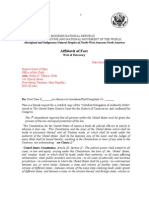Narayan Murthy Report
Narayan Murthy Report
Uploaded by
vicky20008Copyright:
Available Formats
Narayan Murthy Report
Narayan Murthy Report
Uploaded by
vicky20008Original Description:
Copyright
Available Formats
Share this document
Did you find this document useful?
Is this content inappropriate?
Copyright:
Available Formats
Narayan Murthy Report
Narayan Murthy Report
Uploaded by
vicky20008Copyright:
Available Formats
CORPORATE GOVERNANCE BY NARAYANA MURTHY The organizational framework for corporate governance initiatives in India consists of the Ministry
of Corporate Affairs (MCA) and the Securities and Exchange Board of India (SEBI). The first formal regulatory framework for listed companies specifically for corporate governance was established by the SEBI in February 2000, following the recommendations of Kumarmangalam Birla Committee Report. It was enshrined as Clause 49 of the Listing Agreement. Thereafter SEBI had set up another committee under the chairmanship of Mr. N. R. Narayana Murthy, to review Clause 49, and suggest measures to improve corporate governance standards. Some of the major recommendations of the committee primarily related to audit committees, audit reports, independent directors, related party transactions, risk management, directorships and director compensation, codes of conduct and financial disclosures. The Ministry of Corporate Affairs had also appointed a Naresh Chandra Committee on Corporate Audit and Governance in 2002 in order to examine various corporate governance issues. It made recommendations in two key aspects of corporate governance: financial and non-financial disclosures: and independent auditing and board oversight of management. It had also set up a National Foundation for Corporate Governance (NFCG) in association with the CII, ICAI and ICSI as a not-for-profit trust to provide a platform to deliberate on issues relating to good corporate governance, to sensitise corporate leaders on the importance of good corporate governance practices as well as to facilitate exchange of experiences and ideas amongst corporate leaders, policy makers, regulators, law enforcing agencies and nongovernment organizations. The SEBI Committee was constituted under the Chairmanship of Shri N. R. Narayana Murthy, Chairman and Chief Mentor of Infosys Technologies Limited. The Committee comprised members from various walks of public and professional life. This included captains of industry, academicians, public accountants and people from financial press and industry forums. The terms of reference of the committee were to:
To review the performance of corporate governance; and
To determine the role of companies in responding to rumour and other price sensitive information circulating in the market, in order to enhance the transparency and integrity of the market.
The issues discussed by the committee primarily related to audit committees, audit reports, independent directors, related parties, risk management, directorships and director compensation, codes of conduct and financial disclosures. The committee's recommendations in the final report were selected based on parameters including their relative importance, fairness, accountability, transparency, ease of implementation, verifiability and enforceability. The key mandatory recommendations focused on:
strengthening the responsibilities of audit committees; improving the quality of financial disclosures, including those related to related party transactions and proceeds from initial public offerings; requiring corporate executive boards to assess and disclose business risks in the annual reports of companies; introducing responsibilities on boards to adopt formal codes of conduct; the position of nominee directors; and stock holder approval and improved disclosures relating to compensation paid to non-executive directors.
Non-mandatory recommendations included:
moving to a regime where corporate financial statements are not qualified; instituting a system of training of board members; and evaluation of performance of board members.
As per the committee, these recommendations codify certain standards of 'good governance' into specific requirements, since certain corporate responsibilities are too important to be left to loose concepts of fiduciary responsibility. Their implementation through SEBI's regulatory framework will strengthen existing governance practices and also provide a strong incentive to avoid corporate failures.
The Committee noted that the recommendations contained in their report can be implemented by means of an amendment to the Listing Agreement, with changes made to the existing clause 49.
You might also like
- Filipinas Life Assurance Company v. CTADocument1 pageFilipinas Life Assurance Company v. CTADemi Lewk100% (2)
- Nalufenya, Where Innocents Are Tortured To ConfessDocument6 pagesNalufenya, Where Innocents Are Tortured To ConfessAfrican Centre for Media ExcellenceNo ratings yet
- Peace On Earth: Certificate of OwnershipDocument4 pagesPeace On Earth: Certificate of Ownershipannebelmonte100% (1)
- Superior Court of Washington For King County Case 20-2-01055 3 SEA Mikail Nickerson VS. Cory Hofstad - Defendant's Motion To DismissDocument29 pagesSuperior Court of Washington For King County Case 20-2-01055 3 SEA Mikail Nickerson VS. Cory Hofstad - Defendant's Motion To DismissCory Andrew HofstadNo ratings yet
- Module 3 N.R Narayan Murthy Committee Report On CorporateDocument4 pagesModule 3 N.R Narayan Murthy Committee Report On CorporatehitarthsarvaiyaNo ratings yet
- Narayan Murthy Committee Report, 2003Document12 pagesNarayan Murthy Committee Report, 2003Gaurav Kumar50% (2)
- Becg Unit-4.Document12 pagesBecg Unit-4.Bhaskaran Balamurali100% (2)
- Corporate Governance in Indian Banking Sector:: Page - 1Document56 pagesCorporate Governance in Indian Banking Sector:: Page - 1ZEN COMPNo ratings yet
- AmalgamationDocument14 pagesAmalgamationKrishnakant Mishra100% (1)
- Capital StructureDocument4 pagesCapital StructureNaveen GurnaniNo ratings yet
- PPM-Notes-Unit II-Evolution of Management ThoughtDocument23 pagesPPM-Notes-Unit II-Evolution of Management ThoughtNilabjo Kanti PaulNo ratings yet
- BBA VI Semester: Business and SocietyDocument17 pagesBBA VI Semester: Business and SocietyBCom HonsNo ratings yet
- The Japanese ModelDocument3 pagesThe Japanese ModelSiva Prasad PasupuletiNo ratings yet
- Services Provided by Merchant BanksDocument4 pagesServices Provided by Merchant BanksParul PrasadNo ratings yet
- Role and Responsibilities of Independent DirectorsDocument31 pagesRole and Responsibilities of Independent DirectorsLavina ChandwaniNo ratings yet
- MBA - III SemesterDocument44 pagesMBA - III SemesterPrakash VadavadagiNo ratings yet
- Business EthicsDocument28 pagesBusiness EthicsSudhir PawarNo ratings yet
- MBA NotesDocument13 pagesMBA NotesRanjeet Verma LucknowNo ratings yet
- The Role of Social Capital in Enhancing Competitive AdvantageDocument13 pagesThe Role of Social Capital in Enhancing Competitive AdvantageinventionjournalsNo ratings yet
- Greenbury Committee PresDocument19 pagesGreenbury Committee PresDeepesh YadavNo ratings yet
- Nature and Scope of FMDocument2 pagesNature and Scope of FMPankaj2c50% (2)
- The Cadbury CommitteeDocument16 pagesThe Cadbury CommitteeMayank sharmaNo ratings yet
- Competition Act 2002, IndiaDocument41 pagesCompetition Act 2002, Indiasuchitracool1No ratings yet
- Auditing Standards in IndiaDocument8 pagesAuditing Standards in IndiaInderdeep SharmaNo ratings yet
- Naresh Chandra CommiteeDocument23 pagesNaresh Chandra CommiteeAnu Vanu88% (8)
- Ethics Unit - 5Document16 pagesEthics Unit - 5sonnetthomasNo ratings yet
- Tranfer of Knowledge Across National BordersDocument10 pagesTranfer of Knowledge Across National BordersIneha Thind100% (1)
- BFSM Unit IDocument30 pagesBFSM Unit IAbhinayaa SNo ratings yet
- Corporate Governance MAINDocument25 pagesCorporate Governance MAINprashantgoruleNo ratings yet
- Unit-Iii Fundamental AnalysisDocument36 pagesUnit-Iii Fundamental Analysisharesh KNo ratings yet
- Legal and Procedural Aspects of MergerDocument8 pagesLegal and Procedural Aspects of MergerAnkit Kumar (B.A. LLB 16)No ratings yet
- IB Shakeel Sir NotesDocument63 pagesIB Shakeel Sir Notesabinayau2606No ratings yet
- Career Planning & Succession Planning: Prof. Preeti BhaskarDocument40 pagesCareer Planning & Succession Planning: Prof. Preeti BhaskarDrNeeraj N. RanaNo ratings yet
- Financial Institutions Markets and ServicesDocument2 pagesFinancial Institutions Markets and ServicesPavneet Kaur Bhatia100% (1)
- Future of Corporate Governance in IndiaDocument9 pagesFuture of Corporate Governance in Indiatony montanaNo ratings yet
- Three Major Approaches To Business EthicsDocument6 pagesThree Major Approaches To Business Ethicsxndrxx100% (1)
- R. ChiripalDocument42 pagesR. ChiripalRahul PambharNo ratings yet
- Exim PolicyDocument44 pagesExim PolicyRavindra Shenoy100% (1)
- Corporate Governance TheoriesDocument12 pagesCorporate Governance TheoriesManjunath Shettigar100% (1)
- Corporate Evolution Indian ContextDocument13 pagesCorporate Evolution Indian ContextShilpy Ravneet KaurNo ratings yet
- 8 Functions of A Financial Manager (Management) PDFDocument3 pages8 Functions of A Financial Manager (Management) PDFPalash BairagiNo ratings yet
- Introduction To B2B MarketingDocument24 pagesIntroduction To B2B MarketingPurva RathiNo ratings yet
- BBA FMI Unit 1 - NoDocument31 pagesBBA FMI Unit 1 - NoRuhani AroraNo ratings yet
- Corporate Governance Comparison Between Brittania and NestleDocument2 pagesCorporate Governance Comparison Between Brittania and NestleniyatiNo ratings yet
- 402 - Indian Ethos & Business Ethics: Unit No. IIDocument14 pages402 - Indian Ethos & Business Ethics: Unit No. IIshubh'zz JadhavNo ratings yet
- Legal Aspects of Business: Stet School of ManagementDocument33 pagesLegal Aspects of Business: Stet School of ManagementSneha RoyNo ratings yet
- 25 Landmarks in Corporate GovernanceDocument25 pages25 Landmarks in Corporate Governancem_dattaias100% (5)
- Role of Leadership in Strategic Implementation (Behavioural)Document16 pagesRole of Leadership in Strategic Implementation (Behavioural)255820100% (1)
- Corporate RestructuringDocument54 pagesCorporate RestructuringBabasab Patil (Karrisatte)100% (2)
- SCBADocument31 pagesSCBAraggarwal101No ratings yet
- Narayan Murthy Role Model of Corporate GovernanceDocument32 pagesNarayan Murthy Role Model of Corporate GovernanceRahul RafaliyaNo ratings yet
- Redemption of Preference SharesDocument19 pagesRedemption of Preference SharesAshura ShaibNo ratings yet
- 43 Indian - Capital - MarketDocument40 pages43 Indian - Capital - MarketNiladri MondalNo ratings yet
- Unit 1 - HRMDocument43 pagesUnit 1 - HRMbalajiNo ratings yet
- Corporate Governance in India & Sebi Regulations: Presented byDocument15 pagesCorporate Governance in India & Sebi Regulations: Presented byMolu WaniNo ratings yet
- Strategic Issues in Entrepreneurial Ventures and Small BusinessDocument18 pagesStrategic Issues in Entrepreneurial Ventures and Small Businessmurali_mbaNo ratings yet
- Mba Anna University PPT Material For MBFS 2012Document39 pagesMba Anna University PPT Material For MBFS 2012mail2nsathish67% (3)
- Investigation into the Adherence to Corporate Governance in Zimbabwe’s SME SectorFrom EverandInvestigation into the Adherence to Corporate Governance in Zimbabwe’s SME SectorNo ratings yet
- Production And Operations Management A Complete Guide - 2020 EditionFrom EverandProduction And Operations Management A Complete Guide - 2020 EditionNo ratings yet
- Cadbury Committee ReportDocument8 pagesCadbury Committee ReportMukesh Singh100% (1)
- N Murthy Report On Corporate GovernanceDocument8 pagesN Murthy Report On Corporate GovernanceShrishtiNarayaniNo ratings yet
- Module 2 Cg. 2022Document39 pagesModule 2 Cg. 2022Parikshit MishraNo ratings yet
- Auditing and Corporate GovernanceDocument6 pagesAuditing and Corporate Governancesuraj agarwalNo ratings yet
- Procurement Management & Inventory Control - Lecture PDFDocument17 pagesProcurement Management & Inventory Control - Lecture PDFvicky200080% (1)
- I. Introductions To MMDocument6 pagesI. Introductions To MMvicky20008No ratings yet
- The Energy Resource Institute (TERI)Document3 pagesThe Energy Resource Institute (TERI)vicky20008No ratings yet
- AIG Accounting ScamDocument12 pagesAIG Accounting Scamvicky20008100% (1)
- Bench MarkingDocument5 pagesBench Markingvicky20008No ratings yet
- OHSAS 18001 (OHSAS-Occupational Health and Safety Audit System)Document1 pageOHSAS 18001 (OHSAS-Occupational Health and Safety Audit System)vicky20008No ratings yet
- The Importance of PatentsDocument5 pagesThe Importance of Patentsvicky3230No ratings yet
- Role of IT in BPRDocument24 pagesRole of IT in BPRPriya TharwaniNo ratings yet
- Role of Information Technology in ReengineeringDocument7 pagesRole of Information Technology in Reengineeringvicky20008No ratings yet
- MIS Case Study-ManufacturingDocument3 pagesMIS Case Study-Manufacturingvicky20008100% (1)
- Connect The DotsDocument4 pagesConnect The Dotsvicky200080% (3)
- Role ConflictDocument1 pageRole Conflictvicky20008No ratings yet
- MIS Case Study-ManufacturingDocument3 pagesMIS Case Study-Manufacturingvicky20008100% (1)
- Calculation Revenue of AirlineDocument2 pagesCalculation Revenue of Airlinevicky20008No ratings yet
- Factors Affecting Participation in A Civil Society Network (Nangonet) in Ngara DistrictDocument61 pagesFactors Affecting Participation in A Civil Society Network (Nangonet) in Ngara DistrictRepoa TanzaniaNo ratings yet
- Reviewer - Pineda - Ngec0703 The Contemporary WorldDocument6 pagesReviewer - Pineda - Ngec0703 The Contemporary WorlddjapinedaNo ratings yet
- Brownell v. Sun Life Assurance Co. of Canada, 96 Phil. 228 (1954)Document5 pagesBrownell v. Sun Life Assurance Co. of Canada, 96 Phil. 228 (1954)Abhor TyrannyNo ratings yet
- NATURAL JUSTICE-7March2023 (HBO)Document41 pagesNATURAL JUSTICE-7March2023 (HBO)Mr X98No ratings yet
- Pass SlipDocument4 pagesPass SlipGlenzchie Taguibao100% (1)
- National Transportation PolicyDocument5 pagesNational Transportation PolicyAllan Carlo Hernaez SollerNo ratings yet
- Aint Ouis Niversity: School of Engineering and Architecture Mechanical and Mechatronics Engineering DepartmentDocument1 pageAint Ouis Niversity: School of Engineering and Architecture Mechanical and Mechatronics Engineering DepartmentJor Dan100% (1)
- Indian Reservation SystemDocument15 pagesIndian Reservation SystemShivani SinghNo ratings yet
- Reaction PaperDocument2 pagesReaction PaperJan Aldrin AfosNo ratings yet
- The Moorish National RepublicDocument4 pagesThe Moorish National RepublicYaw Mensah Amun Ra100% (2)
- People V CeredonDocument2 pagesPeople V CeredonRaymond ChengNo ratings yet
- Belo, Abiera & Associates For Petitioners in 75875. Sycip, Salazar, Hernandez & Gatmaitan For Luciano E. SalazarDocument13 pagesBelo, Abiera & Associates For Petitioners in 75875. Sycip, Salazar, Hernandez & Gatmaitan For Luciano E. SalazarRuffa ReynesNo ratings yet
- Prohibited Practice Complaint by SHOPODocument20 pagesProhibited Practice Complaint by SHOPOHonolulu Star-AdvertiserNo ratings yet
- Presidential Ad-Hoc Fact Finding Committee v. Desierto, July 24, 2007Document19 pagesPresidential Ad-Hoc Fact Finding Committee v. Desierto, July 24, 2007Mary Licel RegalaNo ratings yet
- 7 Itogon-Suyoc Mines vs. Sangilo-Itogon Workers UnionDocument7 pages7 Itogon-Suyoc Mines vs. Sangilo-Itogon Workers UnionPeter Daniel Cinco BugtasNo ratings yet
- Survey of ChinaDocument9 pagesSurvey of ChinaHạnh TrầnNo ratings yet
- PBA Letter To Township ResidentsDocument1 pagePBA Letter To Township ResidentsPlanet Princeton100% (1)
- Daza vs. Singson Case DigestDocument1 pageDaza vs. Singson Case DigestCharmaine MejiaNo ratings yet
- The Difference Between Utopia and DystopiaDocument3 pagesThe Difference Between Utopia and DystopiasalahNo ratings yet
- POL 407 DR SamDocument4 pagesPOL 407 DR Sammastermind1642No ratings yet
- Lecture-03 (Contributions of Founding Fathers of Pakistan)Document13 pagesLecture-03 (Contributions of Founding Fathers of Pakistan)ww6620431No ratings yet
- Module 6Document7 pagesModule 6khadija khanNo ratings yet
- 1970 Vietnam Phoenix Program Advisor HandbookDocument36 pages1970 Vietnam Phoenix Program Advisor HandbookAndres100% (1)
- Centre State RelationsDocument7 pagesCentre State RelationsSubscriptions NikhilNo ratings yet
- CA 3 Therapeutic ModalitiesDocument35 pagesCA 3 Therapeutic ModalitiesMavel Guarin100% (2)
- History of Agrarian Reform: Salient FeaturesDocument4 pagesHistory of Agrarian Reform: Salient FeaturesShammah Rey MahinayNo ratings yet










